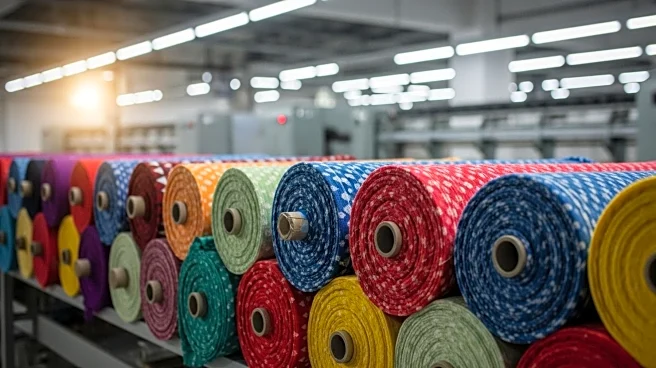What's Happening?
The textile industry in Tiruppur, India, known as 'Dollar City' due to its strong export ties with the United States, is facing significant challenges following the imposition of increased tariffs by President Trump. These tariffs, which were enacted in retaliation for India's purchase of Russian oil, have led to a 50 percent increase in customs duties on Indian products entering the U.S. As a result, many textile factories in Tiruppur are operating at reduced capacity, with some preparing to close units. The industry, which exports $11 billion worth of products annually, has seen a dramatic decline in U.S. orders, with some businesses reporting an 80 percent drop in trade. Local executives are struggling to find alternative markets in Europe and the UK, but the purchasing power of the U.S. market remains unmatched.
Why It's Important?
The tariffs imposed by the U.S. have significant implications for the Indian textile industry, which is a major economic driver in the region. The potential loss of up to three million jobs in Tamil Nadu's textile sector underscores the severity of the situation. The industry's reliance on U.S. exports means that the tariffs could lead to widespread economic hardship, affecting not only business owners but also workers who depend on these jobs for their livelihood. The situation highlights the broader impact of geopolitical tensions on global trade, with businesses caught in the crossfire of international policy decisions. The industry's efforts to offer discounts and sell at a loss to maintain U.S. relationships reflect the desperate measures being taken to mitigate the impact.
What's Next?
The future of the Indian textile industry in Tiruppur remains uncertain as businesses await potential government support or a bilateral trade agreement that could alleviate the tariff burden. Without swift intervention, the industry may face further closures and job losses. Business owners are exploring new markets in Europe, but the transition is challenging due to the established demand from the U.S. market. The situation calls for urgent diplomatic efforts to resolve the trade tensions and provide relief to affected industries. The potential shift in trade dynamics could also lead to long-term changes in global textile supply chains.
Beyond the Headlines
The tariff situation in Tiruppur highlights the ethical and economic dilemmas faced by industries dependent on international trade. The reliance on a single market exposes vulnerabilities that can be exploited by geopolitical shifts. The industry's struggle to adapt to new market conditions raises questions about the sustainability of current trade practices and the need for diversification. The impact on workers, who are often unaware of the broader geopolitical context, underscores the human cost of trade wars and the importance of government intervention to protect vulnerable sectors.










